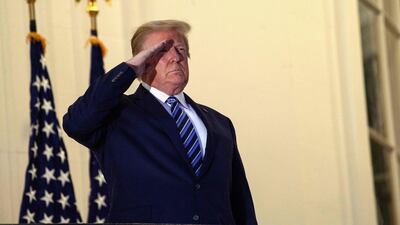Stocks tumbled and bonds soared after US President Donald Trump said he was ending stimulus talks until after the election.
The call came hours after Federal Reserve Chairman Jerome Powell renewed his warning that the economy would stumble without more fiscal support.
In a sombre day for the US economy, its trade deficit also hit a 14-year high, an unwanted marker before the election for a president whose mission has to been to wean America off foreign goods.
The benchmark S&P 500 slumped 1.4 per cent after Mr Trump tweeted his comments late in the trading session, erasing a gain of as much as 0.7 per cent.
The Dow Jones Industrial Average and Nasdaq Composite indexes also ended lower.
"It was certainly a surprise to the market that had started to price in another stimulus," Ed Clissold, chief US equity strategist at Ned Davis Research, told Bloomberg.
“It’s going to be difficult for the economy to gain much traction until there is another round of stimulus.”
US House Speaker Nancy Pelosi had called on Republicans to get on board with a version of the stimulus bill the House passed last week with only Democratic votes.
But significant gaps remained between the Democrats’ $2.2 trillion proposal and a $1.6tn offer backed by the White House.
“Over the past few trading sessions the market had rallied around stimulus talks and now it’s almost a slap in the face,” said Gene Goldman, chief investment officer at Cetera Financial Group.
Deepening deficit could dent Trump's electoral hopes
There are also lingering concerns about the trajectory of the pandemic and its effect on the economy.
The US Commerce Department said the deficit grew 5.9 per cent in August, from $63.4 million to $67.1 billion, the largest gap since August 2006.
Exports increased by 2.2 per cent to $171.9bn but imports rose by 3.2 per cent to $239bn.
In the year to date, the trade deficit is up 5.7 per cent above last year’s levels.
Mr Trump does have the mitigating factor of Covid-19 to explain the wider deficit.
The economic chaos from the pandemic has affected global trade and the performances of countries around the world.
Compared to other major economies, the US is placing greater emphasis on imports than exports.
Greg Daco, the chief US economist at Oxford Economics, told Barron's that the "stronger pull for imports" was for several reasons.
Mr Daco pointed to the US federal stimulus bill putting money into American pockets and boosting consumer spending, a disproportionate amount of which is being spent on foreign goods.
Conversely, other countries have not injected such liquidity into their economies, suppressing the appetite for US-made products.
There was some good news for the Trump team with a rebound in manufacturing bolstering imports.
Inventory-depleted businesses have also started to stock up on vital supplies again.

